Critical Analysis: The Ongoing Debate Surrounding the Human Rights Act
VerifiedAdded on 2023/01/05
|7
|1496
|98
Essay
AI Summary
This essay presents a comprehensive analysis of the Human Rights Act 1998, exploring arguments both for and against its continued necessity in the UK legal system. It discusses the Act's purpose in incorporating the European Convention on Human Rights into UK law, highlighting its role in protecting individual rights and ensuring public bodies respect human rights. The essay also addresses counterarguments, such as the potential for overlap with fundamental rights and the perceived overburdening of the judiciary. It further delves into the practical implications of the Act, referencing case law and considering its impact on various societal issues. The essay concludes by offering a personal perspective, emphasizing the importance of human rights protection while also acknowledging the need for careful implementation to prevent misuse, suggesting that the Human Rights Act is essential for upholding dignity and justice in society.

Word Format
Paraphrase This Document
Need a fresh take? Get an instant paraphrase of this document with our AI Paraphraser
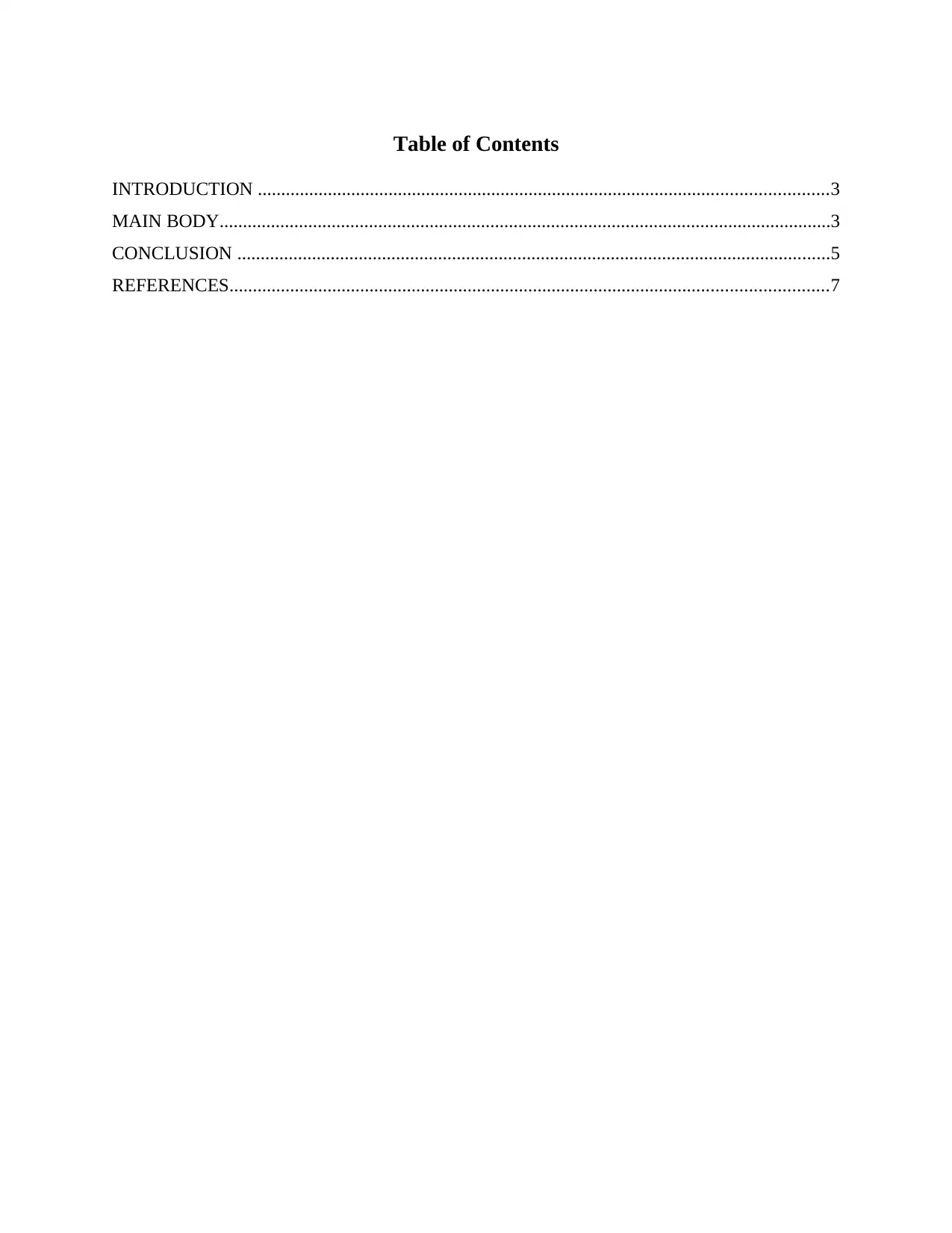
Table of Contents
INTRODUCTION ..........................................................................................................................3
MAIN BODY...................................................................................................................................3
CONCLUSION ...............................................................................................................................5
REFERENCES................................................................................................................................7
INTRODUCTION ..........................................................................................................................3
MAIN BODY...................................................................................................................................3
CONCLUSION ...............................................................................................................................5
REFERENCES................................................................................................................................7
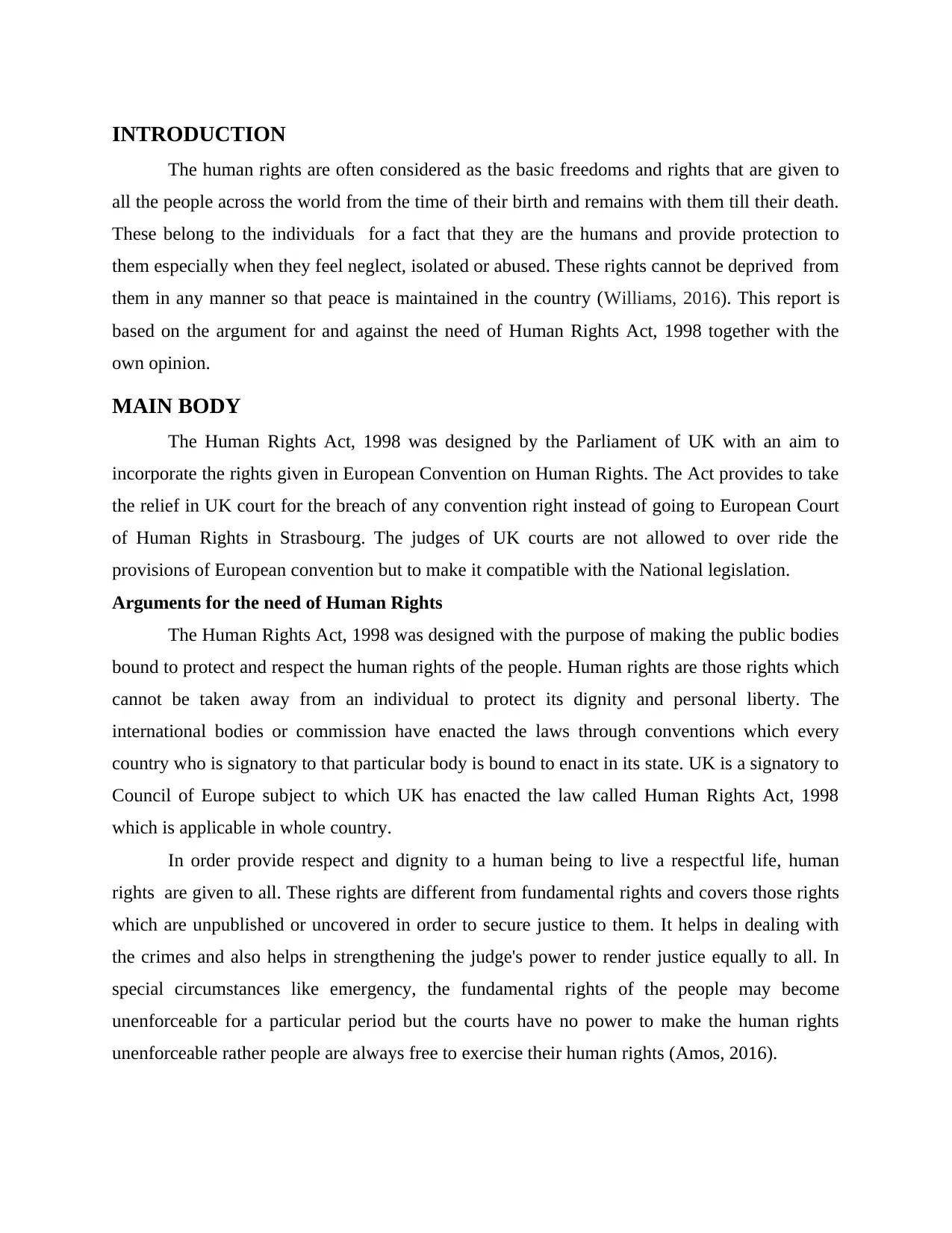
INTRODUCTION
The human rights are often considered as the basic freedoms and rights that are given to
all the people across the world from the time of their birth and remains with them till their death.
These belong to the individuals for a fact that they are the humans and provide protection to
them especially when they feel neglect, isolated or abused. These rights cannot be deprived from
them in any manner so that peace is maintained in the country (Williams, 2016). This report is
based on the argument for and against the need of Human Rights Act, 1998 together with the
own opinion.
MAIN BODY
The Human Rights Act, 1998 was designed by the Parliament of UK with an aim to
incorporate the rights given in European Convention on Human Rights. The Act provides to take
the relief in UK court for the breach of any convention right instead of going to European Court
of Human Rights in Strasbourg. The judges of UK courts are not allowed to over ride the
provisions of European convention but to make it compatible with the National legislation.
Arguments for the need of Human Rights
The Human Rights Act, 1998 was designed with the purpose of making the public bodies
bound to protect and respect the human rights of the people. Human rights are those rights which
cannot be taken away from an individual to protect its dignity and personal liberty. The
international bodies or commission have enacted the laws through conventions which every
country who is signatory to that particular body is bound to enact in its state. UK is a signatory to
Council of Europe subject to which UK has enacted the law called Human Rights Act, 1998
which is applicable in whole country.
In order provide respect and dignity to a human being to live a respectful life, human
rights are given to all. These rights are different from fundamental rights and covers those rights
which are unpublished or uncovered in order to secure justice to them. It helps in dealing with
the crimes and also helps in strengthening the judge's power to render justice equally to all. In
special circumstances like emergency, the fundamental rights of the people may become
unenforceable for a particular period but the courts have no power to make the human rights
unenforceable rather people are always free to exercise their human rights (Amos, 2016).
The human rights are often considered as the basic freedoms and rights that are given to
all the people across the world from the time of their birth and remains with them till their death.
These belong to the individuals for a fact that they are the humans and provide protection to
them especially when they feel neglect, isolated or abused. These rights cannot be deprived from
them in any manner so that peace is maintained in the country (Williams, 2016). This report is
based on the argument for and against the need of Human Rights Act, 1998 together with the
own opinion.
MAIN BODY
The Human Rights Act, 1998 was designed by the Parliament of UK with an aim to
incorporate the rights given in European Convention on Human Rights. The Act provides to take
the relief in UK court for the breach of any convention right instead of going to European Court
of Human Rights in Strasbourg. The judges of UK courts are not allowed to over ride the
provisions of European convention but to make it compatible with the National legislation.
Arguments for the need of Human Rights
The Human Rights Act, 1998 was designed with the purpose of making the public bodies
bound to protect and respect the human rights of the people. Human rights are those rights which
cannot be taken away from an individual to protect its dignity and personal liberty. The
international bodies or commission have enacted the laws through conventions which every
country who is signatory to that particular body is bound to enact in its state. UK is a signatory to
Council of Europe subject to which UK has enacted the law called Human Rights Act, 1998
which is applicable in whole country.
In order provide respect and dignity to a human being to live a respectful life, human
rights are given to all. These rights are different from fundamental rights and covers those rights
which are unpublished or uncovered in order to secure justice to them. It helps in dealing with
the crimes and also helps in strengthening the judge's power to render justice equally to all. In
special circumstances like emergency, the fundamental rights of the people may become
unenforceable for a particular period but the courts have no power to make the human rights
unenforceable rather people are always free to exercise their human rights (Amos, 2016).
⊘ This is a preview!⊘
Do you want full access?
Subscribe today to unlock all pages.

Trusted by 1+ million students worldwide
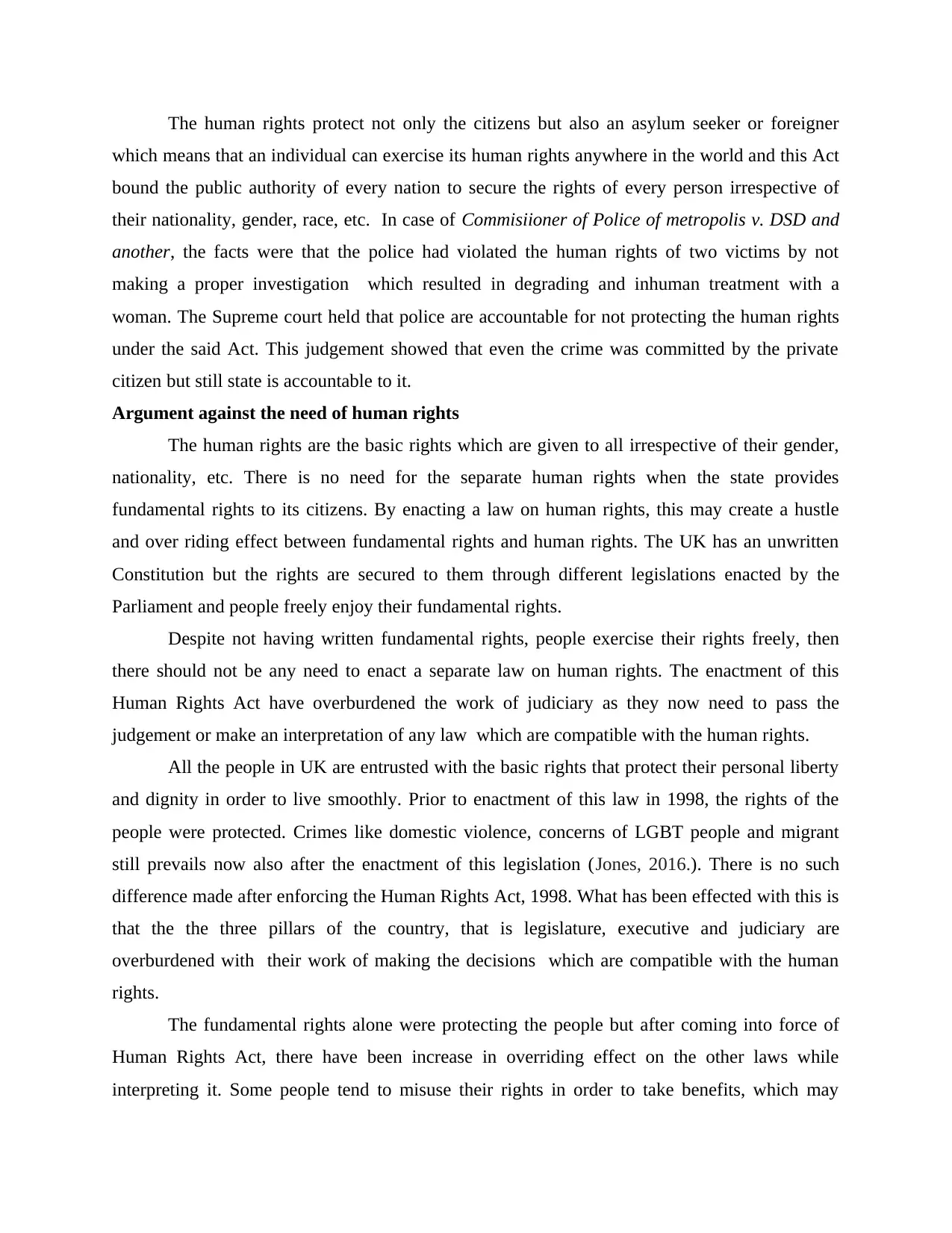
The human rights protect not only the citizens but also an asylum seeker or foreigner
which means that an individual can exercise its human rights anywhere in the world and this Act
bound the public authority of every nation to secure the rights of every person irrespective of
their nationality, gender, race, etc. In case of Commisiioner of Police of metropolis v. DSD and
another, the facts were that the police had violated the human rights of two victims by not
making a proper investigation which resulted in degrading and inhuman treatment with a
woman. The Supreme court held that police are accountable for not protecting the human rights
under the said Act. This judgement showed that even the crime was committed by the private
citizen but still state is accountable to it.
Argument against the need of human rights
The human rights are the basic rights which are given to all irrespective of their gender,
nationality, etc. There is no need for the separate human rights when the state provides
fundamental rights to its citizens. By enacting a law on human rights, this may create a hustle
and over riding effect between fundamental rights and human rights. The UK has an unwritten
Constitution but the rights are secured to them through different legislations enacted by the
Parliament and people freely enjoy their fundamental rights.
Despite not having written fundamental rights, people exercise their rights freely, then
there should not be any need to enact a separate law on human rights. The enactment of this
Human Rights Act have overburdened the work of judiciary as they now need to pass the
judgement or make an interpretation of any law which are compatible with the human rights.
All the people in UK are entrusted with the basic rights that protect their personal liberty
and dignity in order to live smoothly. Prior to enactment of this law in 1998, the rights of the
people were protected. Crimes like domestic violence, concerns of LGBT people and migrant
still prevails now also after the enactment of this legislation (Jones, 2016.). There is no such
difference made after enforcing the Human Rights Act, 1998. What has been effected with this is
that the the three pillars of the country, that is legislature, executive and judiciary are
overburdened with their work of making the decisions which are compatible with the human
rights.
The fundamental rights alone were protecting the people but after coming into force of
Human Rights Act, there have been increase in overriding effect on the other laws while
interpreting it. Some people tend to misuse their rights in order to take benefits, which may
which means that an individual can exercise its human rights anywhere in the world and this Act
bound the public authority of every nation to secure the rights of every person irrespective of
their nationality, gender, race, etc. In case of Commisiioner of Police of metropolis v. DSD and
another, the facts were that the police had violated the human rights of two victims by not
making a proper investigation which resulted in degrading and inhuman treatment with a
woman. The Supreme court held that police are accountable for not protecting the human rights
under the said Act. This judgement showed that even the crime was committed by the private
citizen but still state is accountable to it.
Argument against the need of human rights
The human rights are the basic rights which are given to all irrespective of their gender,
nationality, etc. There is no need for the separate human rights when the state provides
fundamental rights to its citizens. By enacting a law on human rights, this may create a hustle
and over riding effect between fundamental rights and human rights. The UK has an unwritten
Constitution but the rights are secured to them through different legislations enacted by the
Parliament and people freely enjoy their fundamental rights.
Despite not having written fundamental rights, people exercise their rights freely, then
there should not be any need to enact a separate law on human rights. The enactment of this
Human Rights Act have overburdened the work of judiciary as they now need to pass the
judgement or make an interpretation of any law which are compatible with the human rights.
All the people in UK are entrusted with the basic rights that protect their personal liberty
and dignity in order to live smoothly. Prior to enactment of this law in 1998, the rights of the
people were protected. Crimes like domestic violence, concerns of LGBT people and migrant
still prevails now also after the enactment of this legislation (Jones, 2016.). There is no such
difference made after enforcing the Human Rights Act, 1998. What has been effected with this is
that the the three pillars of the country, that is legislature, executive and judiciary are
overburdened with their work of making the decisions which are compatible with the human
rights.
The fundamental rights alone were protecting the people but after coming into force of
Human Rights Act, there have been increase in overriding effect on the other laws while
interpreting it. Some people tend to misuse their rights in order to take benefits, which may
Paraphrase This Document
Need a fresh take? Get an instant paraphrase of this document with our AI Paraphraser
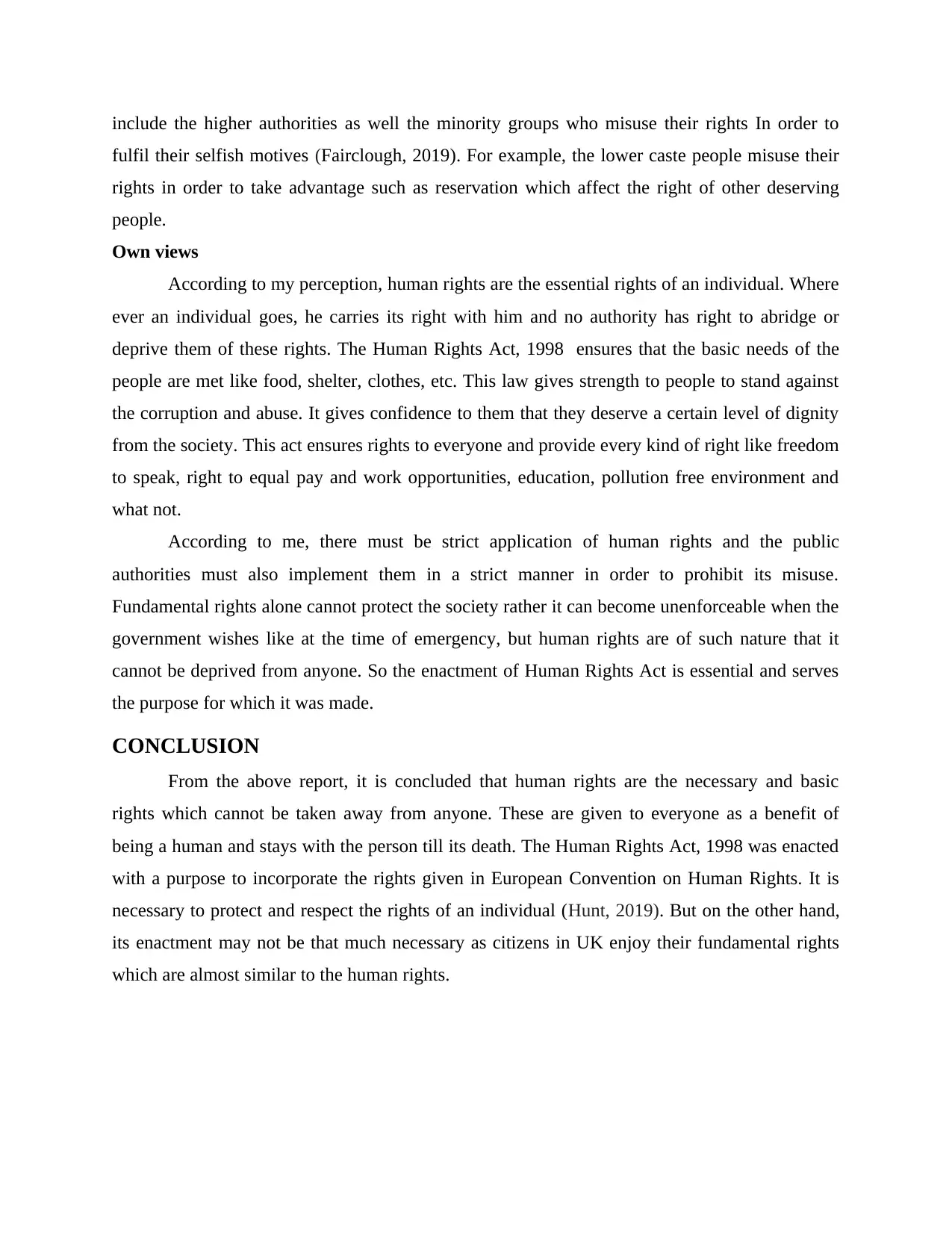
include the higher authorities as well the minority groups who misuse their rights In order to
fulfil their selfish motives (Fairclough, 2019). For example, the lower caste people misuse their
rights in order to take advantage such as reservation which affect the right of other deserving
people.
Own views
According to my perception, human rights are the essential rights of an individual. Where
ever an individual goes, he carries its right with him and no authority has right to abridge or
deprive them of these rights. The Human Rights Act, 1998 ensures that the basic needs of the
people are met like food, shelter, clothes, etc. This law gives strength to people to stand against
the corruption and abuse. It gives confidence to them that they deserve a certain level of dignity
from the society. This act ensures rights to everyone and provide every kind of right like freedom
to speak, right to equal pay and work opportunities, education, pollution free environment and
what not.
According to me, there must be strict application of human rights and the public
authorities must also implement them in a strict manner in order to prohibit its misuse.
Fundamental rights alone cannot protect the society rather it can become unenforceable when the
government wishes like at the time of emergency, but human rights are of such nature that it
cannot be deprived from anyone. So the enactment of Human Rights Act is essential and serves
the purpose for which it was made.
CONCLUSION
From the above report, it is concluded that human rights are the necessary and basic
rights which cannot be taken away from anyone. These are given to everyone as a benefit of
being a human and stays with the person till its death. The Human Rights Act, 1998 was enacted
with a purpose to incorporate the rights given in European Convention on Human Rights. It is
necessary to protect and respect the rights of an individual (Hunt, 2019). But on the other hand,
its enactment may not be that much necessary as citizens in UK enjoy their fundamental rights
which are almost similar to the human rights.
fulfil their selfish motives (Fairclough, 2019). For example, the lower caste people misuse their
rights in order to take advantage such as reservation which affect the right of other deserving
people.
Own views
According to my perception, human rights are the essential rights of an individual. Where
ever an individual goes, he carries its right with him and no authority has right to abridge or
deprive them of these rights. The Human Rights Act, 1998 ensures that the basic needs of the
people are met like food, shelter, clothes, etc. This law gives strength to people to stand against
the corruption and abuse. It gives confidence to them that they deserve a certain level of dignity
from the society. This act ensures rights to everyone and provide every kind of right like freedom
to speak, right to equal pay and work opportunities, education, pollution free environment and
what not.
According to me, there must be strict application of human rights and the public
authorities must also implement them in a strict manner in order to prohibit its misuse.
Fundamental rights alone cannot protect the society rather it can become unenforceable when the
government wishes like at the time of emergency, but human rights are of such nature that it
cannot be deprived from anyone. So the enactment of Human Rights Act is essential and serves
the purpose for which it was made.
CONCLUSION
From the above report, it is concluded that human rights are the necessary and basic
rights which cannot be taken away from anyone. These are given to everyone as a benefit of
being a human and stays with the person till its death. The Human Rights Act, 1998 was enacted
with a purpose to incorporate the rights given in European Convention on Human Rights. It is
necessary to protect and respect the rights of an individual (Hunt, 2019). But on the other hand,
its enactment may not be that much necessary as citizens in UK enjoy their fundamental rights
which are almost similar to the human rights.

⊘ This is a preview!⊘
Do you want full access?
Subscribe today to unlock all pages.

Trusted by 1+ million students worldwide
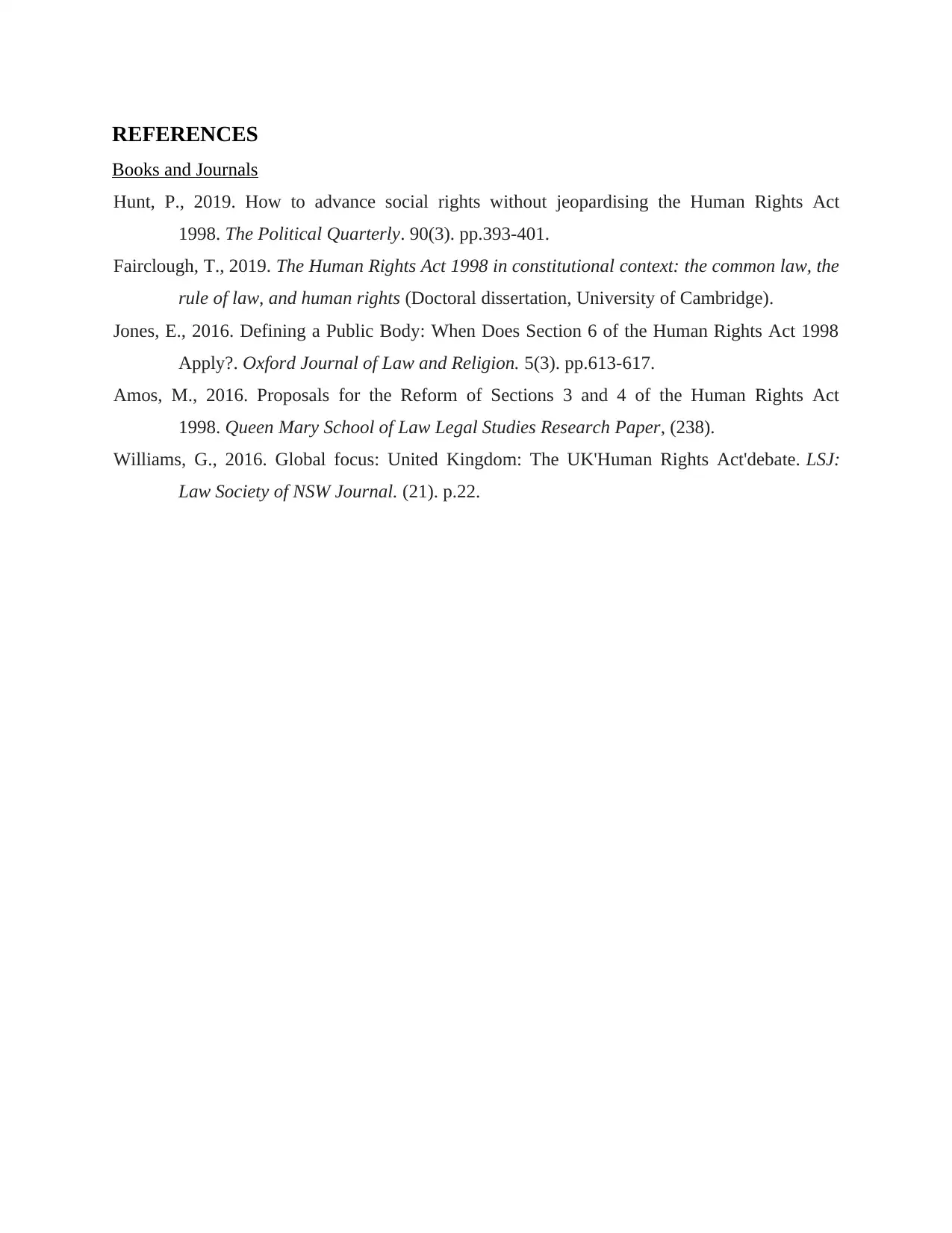
REFERENCES
Books and Journals
Hunt, P., 2019. How to advance social rights without jeopardising the Human Rights Act
1998. The Political Quarterly. 90(3). pp.393-401.
Fairclough, T., 2019. The Human Rights Act 1998 in constitutional context: the common law, the
rule of law, and human rights (Doctoral dissertation, University of Cambridge).
Jones, E., 2016. Defining a Public Body: When Does Section 6 of the Human Rights Act 1998
Apply?. Oxford Journal of Law and Religion. 5(3). pp.613-617.
Amos, M., 2016. Proposals for the Reform of Sections 3 and 4 of the Human Rights Act
1998. Queen Mary School of Law Legal Studies Research Paper, (238).
Williams, G., 2016. Global focus: United Kingdom: The UK'Human Rights Act'debate. LSJ:
Law Society of NSW Journal. (21). p.22.
Books and Journals
Hunt, P., 2019. How to advance social rights without jeopardising the Human Rights Act
1998. The Political Quarterly. 90(3). pp.393-401.
Fairclough, T., 2019. The Human Rights Act 1998 in constitutional context: the common law, the
rule of law, and human rights (Doctoral dissertation, University of Cambridge).
Jones, E., 2016. Defining a Public Body: When Does Section 6 of the Human Rights Act 1998
Apply?. Oxford Journal of Law and Religion. 5(3). pp.613-617.
Amos, M., 2016. Proposals for the Reform of Sections 3 and 4 of the Human Rights Act
1998. Queen Mary School of Law Legal Studies Research Paper, (238).
Williams, G., 2016. Global focus: United Kingdom: The UK'Human Rights Act'debate. LSJ:
Law Society of NSW Journal. (21). p.22.
1 out of 7
Related Documents
Your All-in-One AI-Powered Toolkit for Academic Success.
+13062052269
info@desklib.com
Available 24*7 on WhatsApp / Email
![[object Object]](/_next/static/media/star-bottom.7253800d.svg)
Unlock your academic potential
Copyright © 2020–2026 A2Z Services. All Rights Reserved. Developed and managed by ZUCOL.





